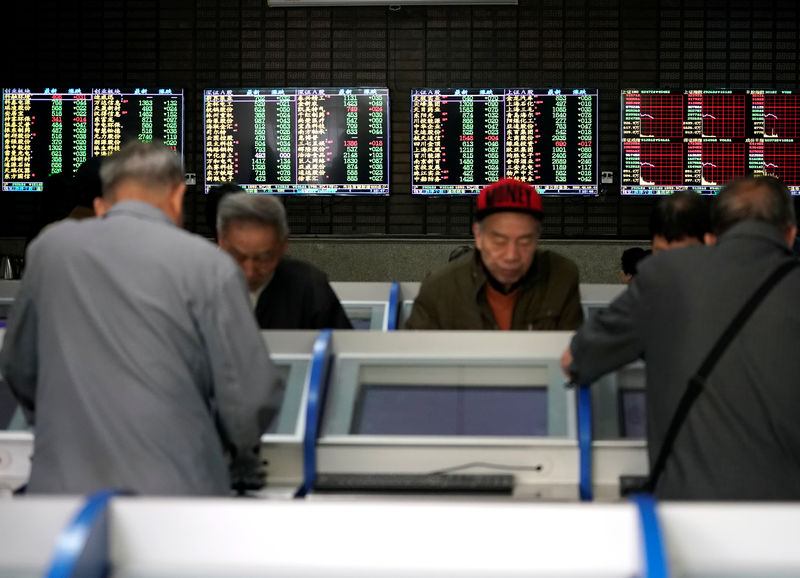By Luoyan Liu and Andrew Galbraith
SHANGHAI (Reuters) - Chinese investors, caught off guard by U.S. President Donald Trump's tariff threats, dumped stocks and sold the yuan currency on Monday as a fresh deterioration in Sino-U.S. trade tensions roiled Asian financial markets.
The country's major stock indexes fell the most in more than three years. The blue-chip CSI300 index and the Shanghai Composite Index both tumbled more than 5 percent, posting their steepest single-day drop since February 2016. Around 1,000 mainland firms plummet the maximum allowed 10 percent daily limit.
Hong Kong's Hang Seng index slumped more than 3 percent.
Trump stunned global markets with a tweet late on Sunday announcing he would hike U.S. tariffs on $200 billion worth of Chinese goods this week and target hundreds of billions more soon, saying trade talks with China were going too slowly.
Markets had largely priced in expectations that a trade deal would be reached soon, further reducing pressure on China's economy, which has recently shown tentative signs of steadying.
Fanning expectations that fresh trade uncertainty could lead to additional monetary easing, China's central bank said on Monday it will cut reserve requirement ratios (RRRs) for small and medium-sized banks.
The yuan dropped to as low as 6.7994 per dollar, its weakest level in 3-1/2 months, while the offshore yuan fell as much as 1.3 percent.
Yields on 10-year Treasury bonds slipped to 3.387 percent, a two-week low.
Trump's move marked a major escalation in trade tensions between the world's two largest economies and raises the prospect of a collapse in the trade talks which would further pressure the global economy.
"The market is re-pricing the situation, as investors had thought trade negotiations were coming to an end," said Ken Cheung, senior Asian FX strategist at Mizuho Bank in Hong Kong.
"If the trade war reignites, some market participants may speculate about renewed yuan depreciation to counteract the negative impact from rising tariffs," he said.
But China's bond market would benefit from "diversion from equities, and renewed expectation for easing," said Frances Cheung, head of Asia macro strategy at Westpac in Singapore.
PESSIMISM
China's Vice Premier Liu He is "very unlikely" to go to the United States this week following Trump's "threat" to hike tariffs, the editor-in-chief of China's influential Global Times said on Monday. The newspaper is published by the ruling Communist Party's People's Daily but it not considered an official publication and does not speak for the government.
Chinese officials were scheduled to meet their U.S. counterparts in Washington on Wednesday after meeting in Beijing last week for a round that Treasury Secretary Steven Mnuchin described as "productive."
"Optimism toward the trade talks turned into pessimism overnight," said Stephen Huang, chief risk officer at Shanghai See Truth Investment Management.
"The government needs to roll out more stimulus to stabilize the market," he said, expecting broader reductions in reserve ratios, and even a possible cut in interest rates.
Stocks fell across the board on Monday, with technology shares among the worst casualties.
The agriculture sector was the only bright spot, with shares including Hefei Fengle Seed Co and Great-Sun Foods Co Ltd surging 10 percent on expectations they could benefit if Beijing retaliates against U.S. imports if Washington hikes tariffs.
'RIGHTFULLY WORRIED'
Chinese shares have surged some 30 percent so far this year, partly due to optimism that a trade deal would be reached, but they have pulled back in recent weeks as investors scaled down expectations for further stimulus in light of better March economic data.
"In the near term, investors are rightfully worried since the lingering threat of a trade war weighed on risk assets in 2018, especially in Asia," Tai Hui, Chief Market Strategist, Asia Pacific, J.P. Morgan Asset Management, said in a note.
But Huang at Shanghai See Truth Investment said that unlike in 2018, when Chinese stocks suffered from a double-whammy of the trade war and Beijing's clampdown on debt, "liquidity conditions are much better this year."
In a move to bolster domestic growth, China's central bank said on Monday it will cut reserve requirements for small and medium-sized banks.
The People's Bank of China (PBOC) said in a statement that the reduction will release about 280 billion yuan ($41.25 billion) in long-term funding, which will be used for loans to small and private companies.
Such a move had been expected this year, but it was announced right before China's stock market opened, and just hours after Trump's tweets.
While the move failed to provide any immediate support to market sentiment, it was expected to give some help to parts of the economy affected by the trade war and a wider slowdown.
"It is in line with the domestic need, which is targeted, while the timing is convenient in view of the heightened external risk," said Westpac's Cheung.

(Luoyan Liu Andrew Galbraith Winni Zhou and Samuel Shen; Editing by Sam Holmes & Kim Coghill)